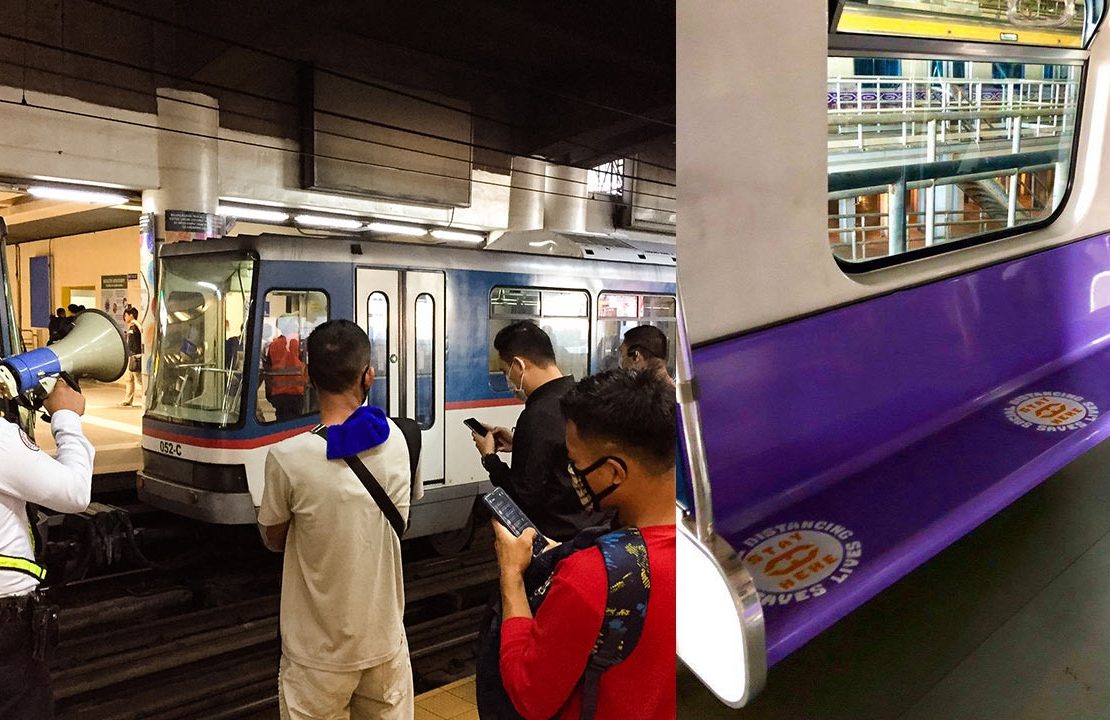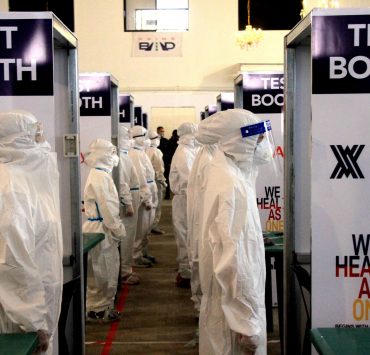What will the post-pandemic public transport system in the country look like? Notorious for its jam-packed train coaches filled to the brim with passengers rushing to get in, the Manila Light Rail Transit (LRT) System and the Manila Metro Rail Transit (MRT) System brace for a “new normal” as they resume operations May 16 after the enhanced community quarantine is lifted.
The LRT-1, LRT-2, MRT-3 and PNR will resume its operations with LIMITED CAPACITY after the lifting of the Enhanced Community Quarantine (ECQ) imposed in Metro Manila, or on May 16, 2020.#DOTrPH🇵🇭#WeHealAsOne#COVIDlangtoPILIPINOtayo#BAHAYmunaBUHAYmuna pic.twitter.com/9pu2QQHvit
— DOTr MRT-3 (@dotrmrt3) May 3, 2020
However, there will be changes put in place to ensure social distancing and public health and safety such as limiting passenger in LRT lines 1 and 2 (40-43 passengers per train car), MRT line 3 (51 per train car) and the Philippines National Railways (148 per train set). All these numbers are based on the Department of Transportation’s (DOTr) passenger simulation with one-meter distance apart.
Pursuant to DOH Guidelines, the following passengers will not be allowed to enter the station: 1) Passengers who are not wearing proper face mask; 2) Passengers showing COVID-19 symptoms or with a registered body temperature of 37.8°C or higher; pic.twitter.com/gtOJEFTslA
— DOTr MRT-3 (@dotrmrt3) May 4, 2020
DOTr has also issued some guidelines on who gets to board the train. People not wearing masks, whose temperature is 37.8 degrees Celsius or higher, senior citizens, individuals aged 0-20 years old and pregnant women will not be allowed entry at the station and will immediately be assisted by train personnel to go to the nearest health facility.
Handwashing or disinfectant stations will be installed to adhere to sanitary measures set by DOH.#DOTrPH🇵🇭#WeHealAsOne#COVIDlangtoPILIPINOtayo#BAHAYmunaBUHAYmuna
Image courtesy of @DOTrPH pic.twitter.com/1RXOq6UGhV
— DOTr MRT-3 (@dotrmrt3) May 5, 2020
Likewise, handwashing and disinfecting stations will be put up at each station.
Over the last few days, DOTr also shared photos inside the train cars with its seats and floors now demarcated to indicate the recommended distance between individuals.
https://www.facebook.com/DOTrPH/posts/1689566047849191?__xts__%5B0%5D=68.ARCDGPHYFTkMq3lARTL_vabkFUKHyQJZ37ej8d2aYz_Okzdy6mcU-D1_lbzan7gQLNPcHxU9PQB102IRpDm8pclyl4MapRae8zDazV5PpJNWsqxmboQXHFK5ZRhh2VE9nfTcyAiXJ67QZLrGhy7YNZ-EJMJ6xCpKqRX3F7M4NwhYzaCGhKhsfi6FiT_P0CXxXBYmMIwpfj4MObjJQ0nI78Tz-uBHb_HIDB18MNZ9OnPxEWRvRWybxrFd88KM1fIIm3l9No_f3e9H8MnRO2-pIP5rJCxKGgAgsR6UO6BgkYFACn8AYJsVefeqrzbQahpbcIdtQ6fiYP4xw5bxmtoZrMOd4w&__tn__=-R
On LRT 2, stenciled signs are put on benches, floors and platforms while on MRT 3 trains, X marks indicate areas to be let free of passengers to ensure that proper distancing is achieved.
Last week, Presidential Spokesperson Harry Roque outlined some industries which can resume its operations in areas with low to moderate COVID-19 infection risk, where general community quarantine (GCQ) is in place. Such sectors include service, retail and production.
[READ: “Bukas na ba?” A list of services and sectors allowed under GCQ]
Whether or not the National Capital Region will continue to be under enhanced community quarantine or will shift to GCQ come May 15 when the second extension is supposed to lapse still depends on whether we can flatten the curve. As of writing, the number of confirmed COVID-19 cases in the country is over 9,500, 5,800 of which are in Metro Manila.
Header photo courtesy of Department of Transportation and Eldon Vince Isidro on Unsplash
Get more stories like this by subscribing to our weekly newsletter here.
Read more:
LOOK: PH’s first mega swabbing center to open May 6 along Roxas Blvd.
DepEd: New school year to begin on Aug. 24
Stranded OFWs to be prioritized by government, Duterte orders LGUs to allow entrance
Writer: CHRISTIAN SAN JOSE




